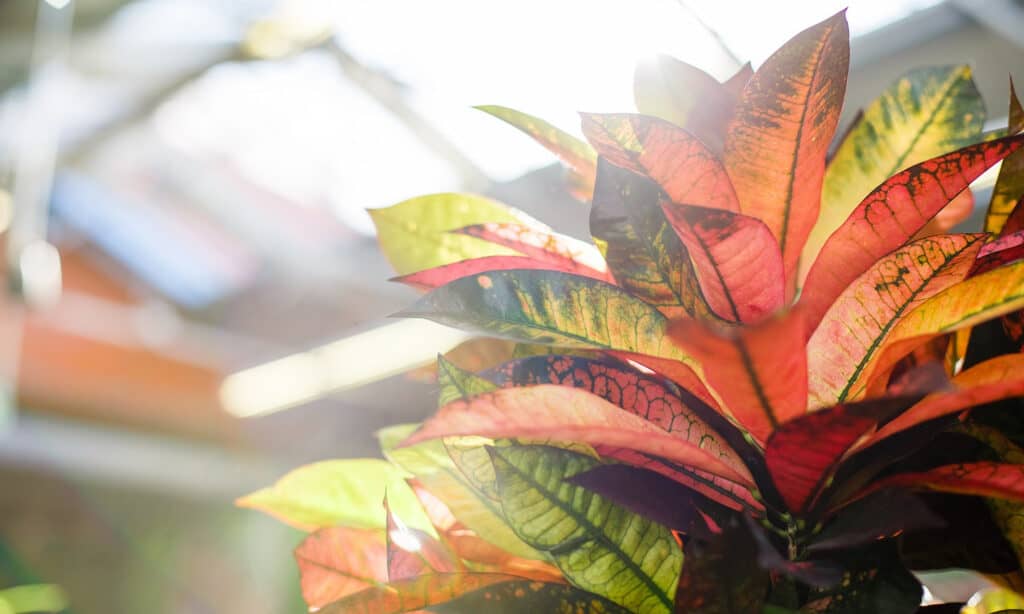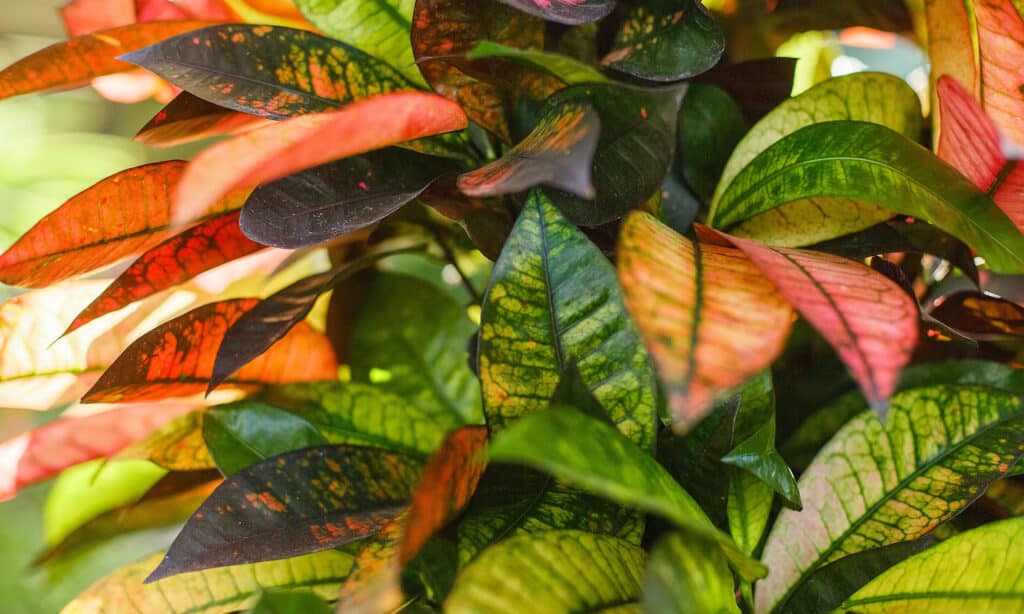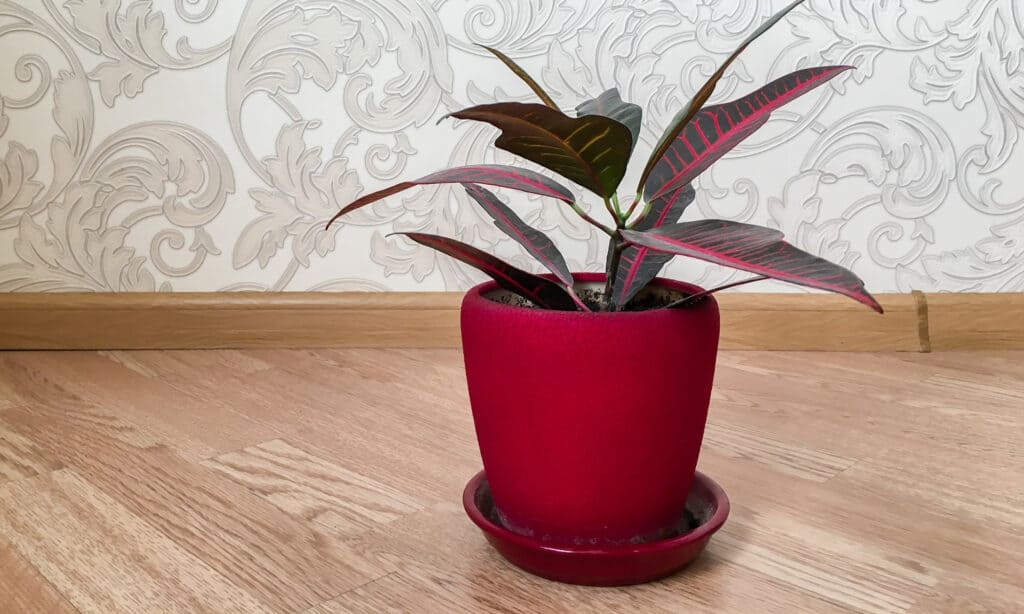If you’re a dog owner who loves to decorate your home with indoor plants, you may have wondered whether certain plants are safe for your furry friend. One plant that may have caught your eye is the croton plant. These tropical plants are known for their bright and colorful foliage, making them a popular choice for indoor decor. However, if you’re considering adding a croton to your home, you may be wondering: are crotons toxic to dogs?
The answer is not a straightforward yes or no. While crotons do contain toxins that can be harmful to dogs if ingested, the severity of the toxicity can vary depending on the size of the dog and the amount of plant material consumed. In this blog post, we’ll explore the potential risks of crotons for dogs and provide expert answers to help you make an informed decision about whether to bring this plant into your home.

What Are Crotons?
Crotons are absolutely stunning tropical plants that boast gorgeous and vibrant foliage. Originally hailing from Southeast Asia, specifically Indonesia and Malaysia, they have rapidly become popular both indoors and outdoors worldwide. They are part of the Euphorbiaceae family, which comprises over 2,000 plant species, and are scientifically known as Codiaeum variegatum. Sometimes referred to as variegated crotons or garden crotons, their most distinguishing feature is their leaves, which come in a vast array of hues, including yellow, green, purple, and red. The leaves also display a diverse range of shapes and patterns, such as spirals or lobes. This variety in color and pattern is dependent on the species of croton and the conditions under which it’s grown.
Gardeners and landscapers love to use crotons as ornamental plants in both indoor and outdoor spaces due to their relative ease of care and ability to thrive in various conditions. They require periodic watering and well-draining soil, and they are adaptable to a wide range of environments. In addition, certain species of croton have long been employed in traditional Southeast Asian medicine.
Are Crotons Toxic To Dogs?
If you’re a dog owner who loves to decorate your home with indoor plants, you may have wondered whether certain plants are safe for your furry friend. One plant that may have caught your eye is the croton plant.
Crotons are beloved for their stunning foliage and come in a variety of colors, shapes, and patterns. Unfortunately, the answer to the question of whether crotons are toxic to dogs is not a simple yes or no. Although crotons contain toxins that can be harmful to dogs if ingested, the severity of the toxicity varies based on the size of the dog and the quantity of plant material consumed.
Some of the symptoms your dog may experience if they ingest croton include vomiting, diarrhea, and loss of appetite. If they consume a large amount of the plant, it can cause more serious complications, such as liver or kidney damage.
As a responsible pet owner, it’s crucial to ensure that any plants you have in your home are safe for your furry friend. If you have a curious dog who loves to explore and potentially eat plants, it may be best to avoid having crotons in your home altogether. However, if you’re determined to add these beautiful plants to your indoor garden, it’s essential to keep them in a location that your dog cannot access, such as on a high shelf or in a room where your dog is not allowed.

What Should You Do If Your Dog Eats A Crotons?
If you suspect that your dog has eaten any part of a croton plant, it’s crucial to act quickly. The severity of the symptoms your dog experiences will depend on the amount of plant material ingested, so it’s essential to contact your veterinarian right away.
The first step is to monitor your dog closely for any signs of illness or discomfort, such as vomiting, diarrhea, loss of appetite, or lethargy. If your dog is experiencing severe symptoms, it’s best to seek veterinary care immediately.
When you contact your veterinarian, be sure to provide as much information as possible about the situation. Let them know when you first noticed the symptoms, how much plant material you think your dog may have consumed, and any other relevant details.
Depending on the severity of the situation, your veterinarian may recommend inducing vomiting or administering medication to help alleviate the symptoms. In some cases, hospitalization may be necessary to provide supportive care, such as intravenous fluids or medications to protect the liver or kidneys.
To avoid future incidents, it’s crucial to keep all potentially toxic plants, including crotons, out of your dog’s reach. This includes not only indoor plants but also any plants in your yard or garden that your dog may have access to. With some caution and awareness, you can help keep your furry friend safe and healthy.
Potential Physical Dangers Presented by Crotons
Crotons are stunning plants that can brighten up any space with their colorful and unique foliage. However, while they are undoubtedly beautiful, crotons can also present some physical dangers, particularly for curious pets and young children.
The most significant danger associated with crotons is their toxicity. Crotons contain toxins that can cause serious health problems in both humans and pets if ingested. These toxins can affect various organs, including the liver, kidneys, and gastrointestinal tract. Symptoms of toxicity can include vomiting, diarrhea, abdominal pain, loss of appetite, and even death in severe cases.
In addition to their toxicity, crotons can also present a physical hazard due to their sharp edges and thorns. The leaves of some species of croton are sharp and can cause injury if handled roughly or accidentally brushed against. The thorns of some varieties can also cause puncture wounds if not handled carefully.
To minimize the physical dangers presented by crotons, it’s essential to take precautions when handling and caring for these plants. Keep crotons out of reach or in a secure room if you have children or pets. When handling crotons, be sure to wear gloves to avoid injury from the sharp edges or thorns.

Signs and Symptoms of Crotons Plant Ingestion
If you suspect that your pet has ingested any part of a Croton plant, it’s essential to monitor them closely for any signs and symptoms of illness. The severity of the symptoms can vary depending on the size of the animal and the amount of plant material consumed.
Some of the most common signs and symptoms of croton plant ingestion include:
- vomiting
- diarrhea
- loss of appetite
- lethargy
- abdominal pain
In some cases, pets may also experience excessive salivation, tremors, or seizures.
If your pet is exhibiting any of these symptoms and you suspect that they may have ingested Croton, it’s crucial to contact your veterinarian right away. Providing your veterinarian with information on the plant species, the amount ingested, and symptoms can help them determine the best course of treatment.

When Should You Take Your Dog To The Vet?
If you suspect that your dog has ingested any part of a croton plant, it’s important to monitor them closely for any signs or symptoms of illness. In some cases, the symptoms may be mild and may resolve on their own with minimal intervention. However, in other cases, croton plant ingestion can cause severe symptoms that require immediate veterinary care.
If your dog is exhibiting any of the following symptoms, it’s crucial to take them to the vet as soon as possible:
- Severe vomiting or diarrhea that persists for more than 24 hours
- Refusal to eat or drink
- Lethargy or weakness
- Abdominal pain or swelling
- Difficulty breathing or wheezing
- Seizures or tremors
- Collapse or loss of consciousness
These symptoms can indicate severe toxicity or other complications that require prompt intervention.
Prevention Is The Best Medicine – How To Prevent Your Dog from Eating Crotons Plants
Prevention is the best medicine when it comes to keeping your furry friend safe from croton plants. Here are some tips to help prevent your dog from eating crotons:
- Keep Croton plants out of reach: Keep croton plants out of reach to prevent dogs from eating them. Place them on high shelves or in a room that your dog cannot access.
- Use barriers: If you can’t keep croton plants out of reach, consider using barriers to prevent your dog from getting to them. This could include using baby gates or putting the plants in a locked room.
- Provide alternative toys and chews: Sometimes dogs will eat plants out of boredom or a desire to chew. To prevent this, provide your dog with plenty of toys and chews to keep them entertained.
- Train your dog: Train your dog to leave plants alone. Reward your dog when they leave plants alone and provide verbal cues to discourage them from approaching plants.
- Be aware of your dog’s behavior: Keep an eye on your dog’s behavior around plants. Intervene if you see them trying to eat them. Redirect their attention to a toy or treat to discourage them from eating the plants.
By taking these steps, you can help prevent your dog from eating crotons and keep them safe from the potential dangers of this toxic plant. If you have any concerns about your dog’s behavior or health, be sure to contact your veterinarian for advice and assistance.

So, Why Do Dogs Eat Crotons Plants?
Dogs may eat croton plants for a variety of reasons. Some dogs may be attracted to the bright and colorful foliage of crotons. Some may try to eat them out of curiosity or boredom. Others may be drawn to the texture of the leaves or the scent of the plant.
In some cases, dogs may eat Croton plants as a form of self-medication. Crotons have been used in traditional Southeast Asian medicine for their medicinal properties. Some dogs may instinctively seek out plants that can help alleviate certain health conditions.
Unfortunately, dogs don’t have the ability to distinguish between toxic and non-toxic plants, so they may inadvertently eat plants that can cause harm. This is why it’s essential to be aware of the potential dangers of crotons and to take steps to prevent your dog from eating them.
If you suspect that your dog has eaten Croton or any other toxic plant, it’s crucial to seek veterinary care immediately. Early intervention can help prevent serious complications and improve the chances of a positive outcome for your furry friend.
Conclusion
In conclusion, croton plants can add a beautiful and colorful touch to your home or garden. However, it’s important to be aware of the potential risks associated with these plants, especially if you have pets or young children in your home. Crotons are toxic to dogs and can cause a range of symptoms, including vomiting, diarrhea, and even liver or kidney damage in severe cases.
To keep your furry friend safe, it’s crucial to take steps to prevent them from eating Croton plants. This can include keeping the plants out of reach, providing alternative toys and chews, and training your dog to leave plants alone. If you suspect that your dog has ingested croton or any other toxic plant, it’s crucial to seek veterinary care immediately.
By being aware of the potential dangers of crotons and taking proactive steps to prevent your dog from eating them, you can enjoy the beauty of these plants safely and without worry. Remember, when it comes to your pet’s health and safety, prevention is always the best medicine.
~Sheena
